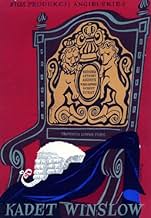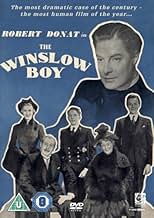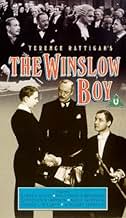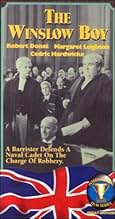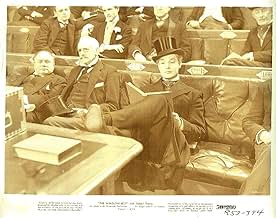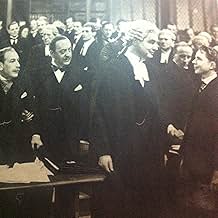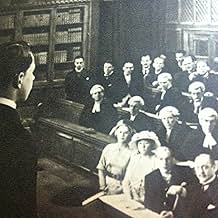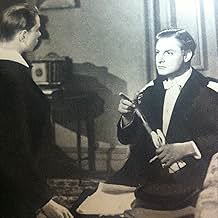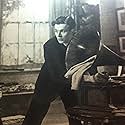IMDb रेटिंग
7.6/10
2 हज़ार
आपकी रेटिंग
अपनी भाषा में प्लॉट जोड़ेंIn pre-WWI England, a youngster is expelled from a naval academy over a petty theft, and his parents raise a political furor by demanding a trial.In pre-WWI England, a youngster is expelled from a naval academy over a petty theft, and his parents raise a political furor by demanding a trial.In pre-WWI England, a youngster is expelled from a naval academy over a petty theft, and his parents raise a political furor by demanding a trial.
- 1 BAFTA अवार्ड के लिए नामांकित
- 1 जीत और कुल 2 नामांकन
Cedric Hardwicke
- Arthur Winslow
- (as Sir Cedric Hardwicke)
फ़ीचर्ड समीक्षाएं
Terence Rattigan, once the toast of London's West End, fell very much out of favor when a new generation of playwrights made his plays seem antiquated and irrelevant. It took David Mamet's excellent filming of the "Winslow Boy" to remind us, that at his best, Rattigan was an exceptionally fine dramatist. Having much enjoyed the movie, I was curious to see the 1948 version directed by Anthony Asquith, who worked on a number of occasions with Rattigan.
It's an exceptional film from all accounts. Asquith's adaptations of theater works for the screen are excellent. Without opening them out too extensively they manage to avoid being stage bound, (Pygmalion, Browning Version, Importance of Being Earnest).
Being already familiar with the storyline, I simply sat back and savored the wonderful performances, and what performances they are. Cedric Hardwicke as the father lacks the softness of Nigel Hawthorne's portrayal and yet that's what precisely makes it ultimately more moving. Robert Donat overflows with charisma and Margaret Leighton plays her very first screen appearance with much intelligence and total aplomb.
The best of British
It's an exceptional film from all accounts. Asquith's adaptations of theater works for the screen are excellent. Without opening them out too extensively they manage to avoid being stage bound, (Pygmalion, Browning Version, Importance of Being Earnest).
Being already familiar with the storyline, I simply sat back and savored the wonderful performances, and what performances they are. Cedric Hardwicke as the father lacks the softness of Nigel Hawthorne's portrayal and yet that's what precisely makes it ultimately more moving. Robert Donat overflows with charisma and Margaret Leighton plays her very first screen appearance with much intelligence and total aplomb.
The best of British
After watching the Terence Rattigan DVD collection (with most of the adaptations being from the 70s and 80s) when staying with family friends last year, Rattigan very quickly became one of my favourite playwrights and he still is. His dialogue is so intelligent, witty and meaty, his characterisation so dynamic, complex and real and the storytelling so beautifully constructed.
'The Winslow Boy' is along with 'The Browning Version' and 'Separate Tables' one of Rattigan's best, containing all of the above and also showing his gift of giving his principal characters an emotional and psychological complexity in a real life situation (if not quite as much as 'The Browning Version'). Was even more blown away by this 1948 film than with the wonderful 1951 adaptation of 'The Browning Version', only because it doesn't have anything that rings false compared with 'The Browning Version's' contrived optimism at the end.
Not only is, again from personal opinion, this 1948 film is the definitive version of 'The Winslow Boy', though it also has the excellent 1976 BBC adaptation with Alan Badel and Eric Porter and the version with Jeremy Northam (which needs to be re-watched but remember it having a lot of good merits) to compete with, but it is also one of the best adaptations of any of Rattigan's plays.
Rattigan's involvement himself with the screenplay has a lot to do with it. It is an incredibly faithful adaptation to the play, practically unscarred and largely untouched, remarkable for a work so text-bound. Fidelity doesn't always come as a good thing when adapted, if too faithful the essence of the work can be lost, here it's the fidelity that makes 'The Winslow Boy' so impressive. Is it talky? Yes it is. That is not the fault of the film. The play is talky. Rattigan in general is talky, but the dialogue itself and the themes that Rattigan touches upon are so amazing that to me this is a rare case of talky not being a bad thing. Rattigan manages to maintain the essence exactly of his own work while also opening up the action and extending it, which immediately gives a more cinematic feel and immediately avoids the potential issue of being too stagy.
Anthony Asquith directs as assuredly as ever, never undermining the intricacies of the events and the complex character dynamic and sharpening up the legal and social dramas and Rattigan's class and hypocrisy insights. 'The Winslow Boy' is a beautiful looking film, lovingly shot with sumptuous settings and costuming.
From start to finish, even when dialogue heavy, the story is riveting, with a much tighter pace than the BBC version, and so much is told and done and in a way where one doesn't miss any of it. The highlight in the play has always been the interrogation scene between Morton and Ronnie, that's the case here in this film as well, some of the cleverest dialogue delivered with nail-biting tension and wit. The characterisation and character dynamic is spot on, where one feels sorry for the right people, amused by the right people, inspired by the right people and grow to hate the right people. The main conflict is so easy to root for (done with real intelligence and meat and one really wants justice done as much as the characters do), and Catherine sums up Morton perfectly in describing him as a cold fish that you grow to admire.
You need good acting to complement all this. The acting is more than good all round, especially Robert Donat whose Morton is even more unforgettable than Alan Badel's and a brilliant performance in its own right (one of his best). More than up to his level are a moving Cedric Hardwicke, a charming and witty Margaret Leighton and Neil North's relatable Ronnie. It was easy to sympathise too with Basil Radford and learn to dislike Frank Lawton in John's eventual treatment of Catherine later on. Wilfred Hyde White makes a distinguished appearance as well.
One expecting a climactic courtroom scene without knowing the play will be disappointed that one finds out the verdict a different way, but that's also how the play ends and it rings just as true this way.
In summary, fantastic film and just as great an example of Rattigan at his best. 10/10 Bethany Cox
'The Winslow Boy' is along with 'The Browning Version' and 'Separate Tables' one of Rattigan's best, containing all of the above and also showing his gift of giving his principal characters an emotional and psychological complexity in a real life situation (if not quite as much as 'The Browning Version'). Was even more blown away by this 1948 film than with the wonderful 1951 adaptation of 'The Browning Version', only because it doesn't have anything that rings false compared with 'The Browning Version's' contrived optimism at the end.
Not only is, again from personal opinion, this 1948 film is the definitive version of 'The Winslow Boy', though it also has the excellent 1976 BBC adaptation with Alan Badel and Eric Porter and the version with Jeremy Northam (which needs to be re-watched but remember it having a lot of good merits) to compete with, but it is also one of the best adaptations of any of Rattigan's plays.
Rattigan's involvement himself with the screenplay has a lot to do with it. It is an incredibly faithful adaptation to the play, practically unscarred and largely untouched, remarkable for a work so text-bound. Fidelity doesn't always come as a good thing when adapted, if too faithful the essence of the work can be lost, here it's the fidelity that makes 'The Winslow Boy' so impressive. Is it talky? Yes it is. That is not the fault of the film. The play is talky. Rattigan in general is talky, but the dialogue itself and the themes that Rattigan touches upon are so amazing that to me this is a rare case of talky not being a bad thing. Rattigan manages to maintain the essence exactly of his own work while also opening up the action and extending it, which immediately gives a more cinematic feel and immediately avoids the potential issue of being too stagy.
Anthony Asquith directs as assuredly as ever, never undermining the intricacies of the events and the complex character dynamic and sharpening up the legal and social dramas and Rattigan's class and hypocrisy insights. 'The Winslow Boy' is a beautiful looking film, lovingly shot with sumptuous settings and costuming.
From start to finish, even when dialogue heavy, the story is riveting, with a much tighter pace than the BBC version, and so much is told and done and in a way where one doesn't miss any of it. The highlight in the play has always been the interrogation scene between Morton and Ronnie, that's the case here in this film as well, some of the cleverest dialogue delivered with nail-biting tension and wit. The characterisation and character dynamic is spot on, where one feels sorry for the right people, amused by the right people, inspired by the right people and grow to hate the right people. The main conflict is so easy to root for (done with real intelligence and meat and one really wants justice done as much as the characters do), and Catherine sums up Morton perfectly in describing him as a cold fish that you grow to admire.
You need good acting to complement all this. The acting is more than good all round, especially Robert Donat whose Morton is even more unforgettable than Alan Badel's and a brilliant performance in its own right (one of his best). More than up to his level are a moving Cedric Hardwicke, a charming and witty Margaret Leighton and Neil North's relatable Ronnie. It was easy to sympathise too with Basil Radford and learn to dislike Frank Lawton in John's eventual treatment of Catherine later on. Wilfred Hyde White makes a distinguished appearance as well.
One expecting a climactic courtroom scene without knowing the play will be disappointed that one finds out the verdict a different way, but that's also how the play ends and it rings just as true this way.
In summary, fantastic film and just as great an example of Rattigan at his best. 10/10 Bethany Cox
I hadn't seen this but was aware of its starry remake some fifty years on; having now seen both, this is the better movie for several reasons. Firstly, three brilliant actors in the cast: Cedric Hardwicke, who still fools me every time and it is a surprise and joy to discover it was him after all when the credits roll; Robert Donat, who had another definitive role in this to add to Mr Chips; and the lovely Margaret Leighton, as the suffragette Winslow daughter who isn't at all militant. Secondly, the plot, which manages to weave quite a few threads along with the central story of little Ronnie Winslow and the stolen postal order. And lastly, because of the sparkle and energy of the script and the detail put into every frame. It's a wonderful film which keeps the attention from wandering, and I highly recommend it.
This film adaption of Terrence Rattigan's play The Winslow Boy is highlighted by Robert Donat's performance of celebrated English barrister, Sir Robert Morton. It's one of Donat's best performances although he's more Donat that Edward Carson on whom the character is actually based.
If you want to see a more accurate portrayal of Carson and by name than the Oscar Wilde film starring Peter Finch is what you have to look at. In that one James Mason plays Carson who was by all accounts one mean man to cross, but a brilliant advocate. In that film Carson is appearing for the prosecution and he's relentless.
In his own elegant way Donat is relentless also, but he's also one cold blooded fish. As he plays Morton, the part is perfect for one of Donat's antiseptic portrayals.
The story concerns young Ronald Winslow played by Neil North who is expelled from the Naval Academy for the theft of a postal money order of five shillings. I'm sure even back in the Edwardian days this would go down as a petty theft, but it involves the military, His Majesty's military which does not make mistakes as we know.
Half the film is devoted to just letting young Mr. North have his day in court. This isn't America, he has to get permission from the government just to be allowed to defend himself. That is something that North's father Cedric Hardwicke is determined to see he gets.
It costs the Winslow family considerable. Older brother Jack Watling is not allowed to finish Oxford, sister Margaret Leighton's fiancé Frank Lawton breaks up with her because of the notoriety and Hardwicke's health goes down hill.
The Winslow Boy is based on a true incident from back in the beginning of the last century and it has good performances all around. Cyril Ritchard and Stanley Holloway do a couple of music hall numbers to capture the spirit of the time and are welcome indeed.
Still The Winslow Boy is Robert Donat's show and a good show it is.
If you want to see a more accurate portrayal of Carson and by name than the Oscar Wilde film starring Peter Finch is what you have to look at. In that one James Mason plays Carson who was by all accounts one mean man to cross, but a brilliant advocate. In that film Carson is appearing for the prosecution and he's relentless.
In his own elegant way Donat is relentless also, but he's also one cold blooded fish. As he plays Morton, the part is perfect for one of Donat's antiseptic portrayals.
The story concerns young Ronald Winslow played by Neil North who is expelled from the Naval Academy for the theft of a postal money order of five shillings. I'm sure even back in the Edwardian days this would go down as a petty theft, but it involves the military, His Majesty's military which does not make mistakes as we know.
Half the film is devoted to just letting young Mr. North have his day in court. This isn't America, he has to get permission from the government just to be allowed to defend himself. That is something that North's father Cedric Hardwicke is determined to see he gets.
It costs the Winslow family considerable. Older brother Jack Watling is not allowed to finish Oxford, sister Margaret Leighton's fiancé Frank Lawton breaks up with her because of the notoriety and Hardwicke's health goes down hill.
The Winslow Boy is based on a true incident from back in the beginning of the last century and it has good performances all around. Cyril Ritchard and Stanley Holloway do a couple of music hall numbers to capture the spirit of the time and are welcome indeed.
Still The Winslow Boy is Robert Donat's show and a good show it is.
"The Winslow Boy" has an interesting pedigree. The story is based on a real case involving a young cadet who was dismissed from his school without any sort of trial or due process. It seems in the early part of the twentieth century in Britain, there was a petty theft and the boy was punished even though it was not clear he'd committed the crime. Not surprisingly, the boy's father insisted there was a miscarriage of justice...but what makes it interesting is that the case didn't drop there but made its way all the way up to sessions of Parliament....where the case was championed by an MP. Some time later, the playwright and screenwriter, Terrence Rattigan, resurrected the story and wrote a play about it...and changed the names in the process. Now, some time after the play, the story finally made its way to film and Rattigan teamed up with one of his favorite directors for this well made movie.
It certainly helps the story that two very distinguished English actors appeared in two of the leading roles, Robert Donat and Sir Cedric Hardwicke. Oddly, Donat was given top billing...even though he doesn't appear in the film until about the 40 minute mark! But both are mesmerizingly good...and the well crafted story really makes an impact on the viewer, as they, too, are outraged by the school's high-handed and unfair handling of the case...especially when the accused was a mere boy. Well worth your time.
It certainly helps the story that two very distinguished English actors appeared in two of the leading roles, Robert Donat and Sir Cedric Hardwicke. Oddly, Donat was given top billing...even though he doesn't appear in the film until about the 40 minute mark! But both are mesmerizingly good...and the well crafted story really makes an impact on the viewer, as they, too, are outraged by the school's high-handed and unfair handling of the case...especially when the accused was a mere boy. Well worth your time.
क्या आपको पता है
- ट्रिवियाThis film is based on the real-life Royal Navy cadet George Archer-Shee (1895-1914), the alleged theft took place in 1908 and the trial in 1910. Archer-Shee was commissioned in the British Army in 1913 and was killed in WWI at the First Battle of Ypres on October 31, 1914.
- गूफ़When the film opens, a suburban train is coming into a station. The locomotive is in the livery of LNER (London & North Eastern Railway). Arthur Winslow alights having told his travelling companions that he has just retired from Lloyds Bank. When he gets home he shows his wife a pocket watch the bank gave him to mark his retirement. It's dated 1912, but the LNER wasn't created until 1923.
- भाव
Sir Robert Morton: I wept today because right had been done.
Catherine Winslow: Not justice?
Sir Robert Morton: No, not justice, right. It's easy to do justice, very hard to do right.
- कनेक्शनVersion of The Winslow Boy (1958)
टॉप पसंद
रेटिंग देने के लिए साइन-इन करें और वैयक्तिकृत सुझावों के लिए वॉचलिस्ट करें
- How long is The Winslow Boy?Alexa द्वारा संचालित
विवरण
- रिलीज़ की तारीख़
- कंट्री ऑफ़ ओरिजिन
- भाषा
- इस रूप में भी जाना जाता है
- Kadet Winslow
- फ़िल्माने की जगहें
- London Film Studios, Shepperton, सरी, इंग्लैंड, यूनाइटेड किंगडम(studio: produced at London Film Studios Shepperton, England)
- उत्पादन कंपनियां
- IMDbPro पर और कंपनी क्रेडिट देखें
- चलने की अवधि1 घंटा 57 मिनट
- रंग
- पक्ष अनुपात
- 1.37 : 1
इस पेज में योगदान दें
किसी बदलाव का सुझाव दें या अनुपलब्ध कॉन्टेंट जोड़ें


